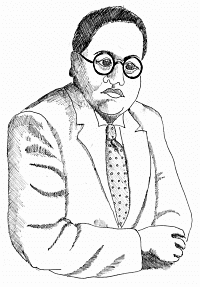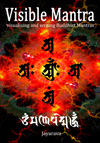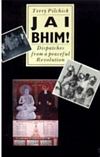
Dr. B. R. Ambedkar is the revered leader of new Buddhists in India, and also inspires many Western Buddhists. Despite heavy odds against him as an untouchable person he became educated and worked for the benefit of his people. Dr. Ambedkar was India's first Law Minister, and fought hard to outlaw caste prejudice in India. In this he was opposed by Gandhi who saw caste as important to Indian culture and wanted to preserve it. Ambedkar had grown up untouchable - that is to say that caste Hindus considered his presence to by ritually polluting. Ambedkar decided, however, that in order to escape the oppression of caste, he would need to leave Hinduism behind. After considering his options he converted to Buddhism. Millions of his followers also converted. Dr. Ambedkar is also known affectionately as Babasaheb.
Jai Bhim - जै भीम्
Indian Buddhist greet each other with Jai Bhim! which means Victory to Bhim, ie victory to Ambedkar.

jai bhīm
Devanāgarī - Hindi

jaya bhīm
Devanāgarī - Sanskrit

jai bhīm
Siddhaṃ - Hindi
Here are three ways of writing Jai Bhim. In Hindi the word for Victory can be written jai whereas in Sanskrit the word is jaya. Hindi obviously comes from the root of Sanskrit but the pronunciation has changed, especially at the ends of words. In Hindi the virama on the m is not always added since it is rotuinely pronounced. I have added it in the Siddhaṃ
Chants
Below are some chants which you will hear in India from followers of Dr. Ambedkar. They are in the Hindi style of Devanāgarī which differs in some minor respects from Sanskrit.

ḍaoktar bhīmrav rāmjī āṃbeḍkarāṃcā vijaya aso
Dr. B. R. Ambedkar... may he succeed!
ढॉक्टर् भीमरव् आंबेड्करांचा विजय असो

ḍaoktar bhīmrao rāmjī āṃbeḍkaraṃ jiṃdābād
Long live Dr. B. R. Ambedkar
ढॉक्टर् भीमरव् रामजी आंबेडकर् जिंढाबाढ्
Notes
Orthography
The standard romanisation of Dr. Ambedkar's name hides a lot from the uninitiated, and it took quite a bit of consultation with my friend Dharmacari Amalabohi to find the correct spelling in Devanāgarī. A more accurate transliteration of the Devanāgarī would be: Ḍaoktar Bhīmraw Rāmjī Āṃbeḍkar.
The word Jinadabad apparently comes from a Hindi/Urdu adaptation of the Russian slogan "long live the revolution", ie Inquilab Zindabad, so might be translated as Viva!




